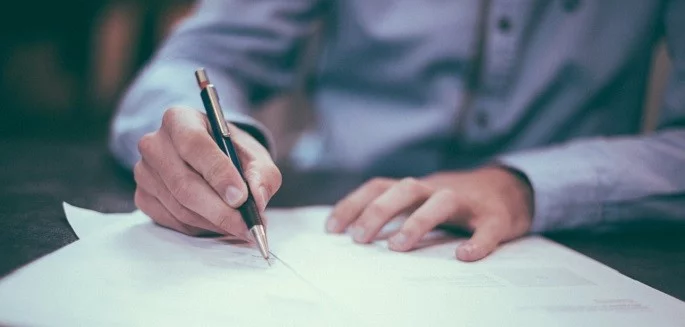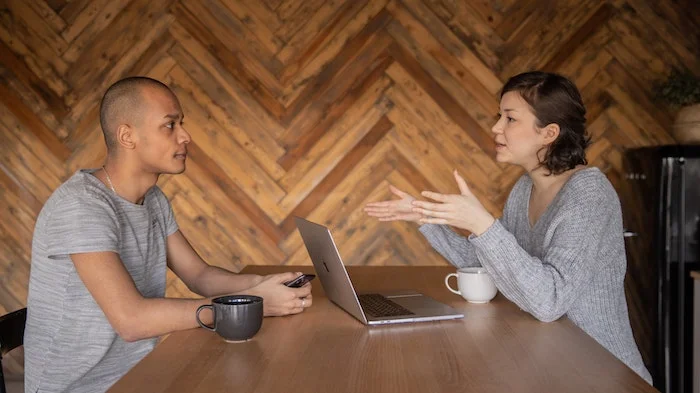Journaling To Cope With Anxiety
Can something as simple as writing down your thoughts help with stress and anxiety?
Journaling is a low-cost and accessible way to manage anxiety – all you need is a pen, paper or something to type on.
Next time you’re feeling anxious, consider putting pen to paper and using journaling to cope with anxiety.
For more guidance on journaling for anxiety, give our team a call on 0800 088 66 86
What is anxiety?

Everyone feels anxious at some point in their lives. It’s a completely normal response to feeling threatened, overwhelmed or stressed.
In fact, 1 in 6 adults in the UK have reported experiencing anxiety in recent years. [1]
Anxiety can be described as a feeling of unease or worry. Different situations can cause anxiety such as an important job interview, waiting for medical results or sitting an exam.
Feeling anxious can even help us in some ways – it can increase motivation and alertness, pushing us to solve problems and identify risks.
However, when anxiety gets out of control it can cause many problems. Some people feel anxious a lot of the time, even over situations that aren’t worth worrying about.
This is known as an anxiety disorder and it can prevent you from living and enjoying your life to the fullest.
The good news is that no matter how mild or severe your anxiety is, it can be treated and managed with self-help techniques such as journaling or even professional counselling.
To learn more about the nature of anxiety, talk to our expert team today on 0800 088 66 86
What are the symptoms of anxiety?

Anxiety can affect you both physically and mentally. For someone with an anxiety disorder, these feelings can become so familiar that they may not even realise that we are experiencing them so frequently.
It’s important to learn how to recognise the symptoms of anxiety.
This can help you to take action before it has a chance to take over your life.
Physical symptoms of anxiety include:
- A swirling or churning feeling in your stomach
- Increased heart rate
- Breathing faster than usual
- Feeling like you might be sick
- Needing to go to the toilet frequently
- Clenching or grinding your teeth
- Pins and needles, particularly in your fingers
- Involuntarily muscle twitches
- Feeling dizzy or light-headed
- A ringing sound in your ears
- Tense muscles
Psychological symptoms of anxiety include:
- Needed to be constantly reassured by other people
- Being unable to stop worrying
- Feeling an impending sense of doom or dread
- Believing that something bad is going to happen
- Becoming depressed
- Constantly ruminating over a past or imagined situation
- Planning too far ahead and worrying about what will happen
- Feeling disconnected from the people and events around you
- Feeling that something bad will happen if you stop worrying
- Worrying that other people are looking at you and can tell that you’re anxious
As well as these physical and psychological symptoms, anxiety can affect your daily life.
It can be more difficult to hold down a job if you are struggling with an anxiety disorder, self-care often takes a back seat and forming and maintaining relationships can feel overwhelming.
If you’ve started spotting the signs and symptoms of anxiety, give our team a call on 0800 088 66 86
What are the causes of anxiety?

It’s not always possible to identify the sole cause of anxiety. There are many factors that contribute towards this condition, and many people may have anxiety due to two or more events.
Below are some of the most common triggers and causes of anxiety.
1. Childhood experiences
The way you were raised as a child can make you more or less likely to develop an anxiety disorder in later life.
If your parents were emotionally unavailable, abusive or neglectful, this can be a common cause of anxiety.
Even seemingly loving and caring parents can contribute to anxiety, for example being too overprotective or strict with their children.
Losing a parent at a young age is another common factor in developing anxiety as an adult.
2. Past trauma
If you have experienced trauma, studies show that you are more likely to develop anxiety.
Traumatic events include sexual assault, witnessing an accident, experiencing racism, domestic violence and being diagnosed with a life-threatening illness.
Anxiety is also one of the main symptom of Post-Traumatic Stress Disorder (PTSD), a mental health condition that can be triggered by a traumatic event.
6,665,000 people in the UK are expected to develop PTSD at some point in their lives. [2]

3. Stressful events
Your current life events and situation can also cause anxiety.
Many people struggle to adapt to big changes, such as moving to a new country or getting a divorce.
Even positive changes such as buying a house or getting married can trigger anxiety.
Other events that can cause anxiety include money problems, losing a loved one, being diagnosed with a medical issue, being bullied and increased pressure at work.
Many people noticed an increase in their anxiety during the coronavirus pandemic. This may not go away just because life has got back to normal.
4. Substances and medication
If you regularly use substances such as alcohol and drugs, you may notice that you feel more anxious than usual.
This is due to the effects of these substances. While you may feel better while you are using them, the anxiety is usually much worse when you stop.
This can trap you in a vicious cycle of substance use that can develop into an addiction.
Prescription medications for various physical and mental health conditions can also cause anxiety. Speak to your doctor if you are concerned about any side effects.
Caffeine is another substance that can increase your anxiety, particularly if you consume too much or are sensitive to it.
Whatever you think your causes of anxiety may be, give our team a call on 0800 088 66 86
What is anxiety journaling?

The act of writing out your thoughts is known as journaling, and people have been doing this for hundreds of years.
You may have heard of Anne Frank who detailed her time spend in hiding during WW2, or Samuel Pepys’ diary of life in London during the 1660s.
While many people keep a regular journal as a way to remember key memories and life events, anxiety journaling is specifically focused on anxiety and mental health.
It’s a way to get all your worries and fears out of your head and onto paper (or screen) which can help you to make sense of them.
A key part of anxiety journaling is rereading your words and finding different ways to approach the situation that is making you anxious.
It’s a form of self-reflection, giving you a more objective look at what’s troubling you and helping you to feel calmer both in the short and long term.
Learn everything you need to know about anxiety journaling by giving us a call today on 0800 088 66 86
What are the different types of journaling?

Everyone is different when it comes to journaling, and what works for you might not necessarily work for someone else.
There are four common types of journaling used in anxiety journaling.
It may be helpful to try them all out to see which one works best for you.
1. Freewriting
As the name suggests, freewriting involves simply writing down whatever is in your head.
It’s a stream of consciousness that can reveal what’s on your mind and how you’re feeling in the current moment.
It can be helpful to set a timer and begin freewriting, stopping only when the timer goes off.
If you’re feeling anxious, freewriting can be a great way to find relief and get these thoughts out of your mind and onto paper where you can look at them more objectively.
2. Expressive writing
Expressive writing involves choosing a specific memory, situation, emotion or event and pouring out your thoughts about it.
You may find that as you write, you begin to think more deeply about the focus of your journaling and may begin to see it in a different light.
Expressive writing can dredge up many emotions including anger, sadness and regret. It can be difficult to sit with these feelings, but over time it can be very beneficial.
3. Thought diary
This form of journaling is targeted specifically towards anxious thoughts and stress.
Keeping a thought diary is an ongoing process that involves writing down your thoughts and emotions throughout the day, as well as the specific time that you experienced them and what you were doing.
This can help you spot patterns in your emotions and thoughts, making it possible to break negative and unhelpful cycles that may be contributing towards your anxiety.
4. Gratitude journaling
It’s difficult to feel anxious or depressed when you are focused on what you are grateful for.
Gratitude journaling is a regular practice that involves writing down all the things in your life that make you feel grateful. This can be as small as clean sheets on your bed or as large as owning your own home.
You can list them in bullet points, or write longer paragraphs about each one. As long as you try to do this every day, gratitude journaling can have an extremely positive impact on your mental health. [3]
Whatever type of anxiety journaling works for you, find out more by talking to our experts on 0800 088 66 86
Tips to start journaling for anxiety

Journaling doesn’t come naturally to everyone, so we’ve compiled a series of tips to help you start journaling for anxiety:
- Decide how you want to keep your journal. Are you more comfortable writing things down by hand, or can you express yourself better with your phone or laptop?
- Just write. Don’t worry about sentence structure, grammar or whether your words flow. Journaling for anxiety is just for you, and no one else is going to read or judge your work.
- Similarly, write about whatever you want. You can describe your day, any emotions that have popped up or a memory that you need to get out.
- Read over your journal entry once you have written it. Do you notice any patterns over time? Are there any limiting or negative self-beliefs that you can challenge?
- If you’ve written down some worries, try adding notes to your journal entry. Look at the situation objectively, as though you were giving advice to a friend, and write down one way to tackle each worry differently.
- Journal as often as possible, ideally every day. It doesn’t need to take long, as just 20 minutes of writing can have a great effect on your anxiety and general mental health.
- If you simply don’t know what to write, use journaling prompts – we’ve included some below if you’re in need of a little inspiration.
Once you make journaling a habit, you’ll find that it starts feeling much more natural and your words will begin to flow more easily.
For more advice about anxiety journaling, give our experts a call on 0800 088 66 86.
What are the benefits of journaling for anxiety?

Journaling for anxiety has many benefits, both immediate and long-term.
One study found [4] that over 56% of people involved in an anxiety journaling study reported better mental health after one month of regular journaling.
Below are some of the many benefits of journaling for anxiety:
- Anxiety journaling can help you to identify specific thoughts or patterns of behaviour that may be contributing to your anxiety. With this newfound knowledge, you can work to break the cycle.
- This practice can also help you to learn more about yourself. You will have a record of your thoughts, emotions and experiences over a period of time, and seeing your words on paper will help you to understand how you view the world.
- Journaling for anxiety is also a great way to challenge negative or self-limiting thoughts. Sometimes, seeing them written down can help you to view your worries objectively and realise how unrealistic they really are.
- You may also develop better self-esteem due to anxiety journaling. Writing down your strengths, things you love about yourself and all the good things in your life can give you something to turn to when you’re feeling down.
- Anxiety journaling can help your present and future self. It can be a huge relief to get your thoughts out of your mind, and it can be very illuminating to read over them again in the future. This can help you to nip anxiety in the bud before it begins to spiral out of control.
Journaling may feel like work at first, but once you notice the positive effect it has on your anxiety you may never want to stop!
Experience all the benefits of anxiety journaling for yourself – find out more by calling us on 0800 088 66 86
Journal prompts for anxiety

It can be hard to organise your thoughts when you’re feeling particularly anxious. As a result, you may want to start journaling to cope with anxiety but have no idea where to start.
Below are 15 journal prompts for anxiety that can help you put pen to paper, even when you’re feeling overwhelmed and stressed.
- What am I anxious about right now? What is the best-case scenario in this situation?
- What does anxiety feel like to me?
- What thoughts are going through my head right now?
- How has my anxiety held me back in my life?
- List five things you are grateful for today.
- What is a memory, belief or person that I need to let go of?
- What are some things that trigger my anxiety?
- What do I love most about myself?
- What is something I would like to change about myself?
- What is the best advice I have ever received about anxiety? How can I apply it to this situation?
- What are the signs that I am going to have an anxiety attack?
- List five things you can see, four things you can touch, three things you can hear, two things you can smell and one thing you can taste.
- What are some activities I can do that make me feel calm and relaxed?
- What would a day without anxiety look like to me?
- Write a letter to someone you want to forgive (you don’t have to send it!)
You don’t need to limit yourself to the above journal prompts for anxiety.
Write about whatever you feel like, but these questions can help you to get started when you simply don’t know what to say.
For more prompts about anxiety journaling, call us on 0800 088 66 86
Should I see a therapist for my anxiety?

While anxiety journaling can be extremely effective, some people may need professional help to overcome this disorder.
Seeking counselling and therapy is not a sign of weakness. In fact, it’s a sign of strength – you are reaching out for help despite your worries and fears.
If your anxiety is not getting better or you are struggling to function in your daily life despite self-help techniques such as anxiety journaling, it may be time to see a therapist.
Finding a counsellor may feel impossible, particularly when you are already feeling anxious and overwhelmed.
Reaching out to your doctor can be a great first step. They will be able to refer you to NHS counselling, although there is often a long wait for treatment.
You can also search for counsellors online, or ask a trusted friend or family member for a recommendation. Make sure to find someone who specialises in treating anxiety.
Don’t be afraid to ‘shop around’ for your therapist, and don’t feel that you have to commit to one unless they feel like a good fit.
It’s common for people to move between therapists until they find one that they connect with.
There is no shame in accessing counselling services.
You don’t need to live with an anxiety disorder – there are ways to manage your feelings and start feeling like your old self again.
Whatever type of anxiety journaling works for you, find out more by talking to our experts on 0800 088 66 86
References
[1] https://commonslibrary.parliament.uk/research-briefings/sn06988/
[2] https://www.ptsduk.org/ptsd-stats/
[3] https://www.health.harvard.edu/healthbeat/giving-thanks-can-make-you-happier




